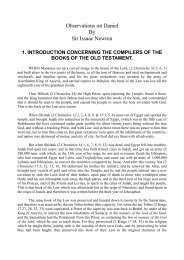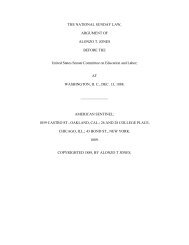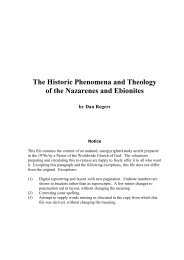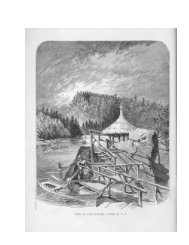THE EARLY CHRISTIAN SABBATH - Friends of the Sabbath Australia
THE EARLY CHRISTIAN SABBATH - Friends of the Sabbath Australia
THE EARLY CHRISTIAN SABBATH - Friends of the Sabbath Australia
Create successful ePaper yourself
Turn your PDF publications into a flip-book with our unique Google optimized e-Paper software.
The Early Christian <strong>Sabbath</strong><br />
Constantine was celebrating his twentieth year as emperor, Eusebius, <strong>the</strong> church<br />
historian, says <strong>of</strong> <strong>the</strong> glory <strong>of</strong> his reign. “One might have thought that a picture <strong>of</strong> Christ's<br />
kingdom was thus shadowed forth, and a dream ra<strong>the</strong>r than reality.” - The Life <strong>of</strong><br />
Constantine, book 3, chapter 15, in Nicene and Post-Nicene Fa<strong>the</strong>rs, Second Series,<br />
volume 1, Page 524.<br />
Again when Constantine had taken with him into <strong>the</strong> government his three sons as<br />
Caesars, Eusebius says:<br />
“Invested as he is with a semblance <strong>of</strong> heavenly sovereignty, he directs his gaze<br />
above, and frames his earthly government according to <strong>the</strong> pattern <strong>of</strong> that divine original,<br />
feeling strength in its conformity to <strong>the</strong> monarchy <strong>of</strong> God.” Oration in Praise <strong>of</strong><br />
Constantine, chapter 3, paragraph 5, in Nicene and Post-Nicene Fa<strong>the</strong>rs, Second Series,<br />
volume 1, page 584.<br />
It is this emperor, so highly praised by a leading churchman <strong>of</strong> his day. Yet still a<br />
pagan, who in pi issued <strong>the</strong> first “blue” law:<br />
“All judges and city people and <strong>the</strong> craftsmen shall rest upon <strong>the</strong> venerable Day<br />
<strong>of</strong> <strong>the</strong> Sun. Country people, however, may freely attend to <strong>the</strong> cultivation <strong>of</strong> <strong>the</strong> fields,<br />
because it frequently happens that no o<strong>the</strong>r days are better adapted for planting <strong>the</strong> grain<br />
in <strong>the</strong> furrows or <strong>the</strong> vines in trenches. So that <strong>the</strong> advantage given by heavenly<br />
providence may not for <strong>the</strong> occasion <strong>of</strong> a short time perish.”-Code <strong>of</strong> Justinian, b. 3, title<br />
12, 3; trans. In Ayer's Source Book for Ancient Church History, item 59 (9). Of this and a<br />
later law, <strong>the</strong> church historian Sozomen, writing about A. D. 440, says:<br />
“He also enjoined <strong>the</strong> observance <strong>of</strong> <strong>the</strong> day termed <strong>the</strong> Lord's day, which <strong>the</strong><br />
Jews call <strong>the</strong> first day <strong>of</strong> <strong>the</strong> week, and which <strong>the</strong> pagans dedicate to <strong>the</strong> sun, as likewise<br />
<strong>the</strong> day before <strong>the</strong> seventh [Friday], and commanded that no judicial or o<strong>the</strong>r business<br />
should be transacted on those days, but that God should be served with prayers and<br />
supplications.” - Ecclesiastical History, book 1, chapter 8, in Nicene and Post-Nicene<br />
Fa<strong>the</strong>rs, Second Series, volume 2, Page 245.<br />
Constantine’s laws <strong>of</strong> worship applied also in <strong>the</strong> Roman army: “Accordingly he<br />
enjoined on all <strong>the</strong> subjects <strong>of</strong> <strong>the</strong> Roman Empire to observe <strong>the</strong> Lord's day, as a day <strong>of</strong><br />
rest, and also to honor <strong>the</strong> day which precedes <strong>the</strong> <strong>Sabbath</strong>. In memory, I suppose, <strong>of</strong><br />
what <strong>the</strong> Savior <strong>of</strong> mankind is recorded to have achieved on that day [<strong>the</strong> crucifixion].<br />
And since his desire was to teach his whole army zealously to honor <strong>the</strong> Savior's day<br />
(which derives its name from light, and from <strong>the</strong> sun), he freely granted to those among<br />
<strong>the</strong>m who were partakers <strong>of</strong> <strong>the</strong> divine faith, leisure for attendance on <strong>the</strong> services <strong>of</strong> <strong>the</strong><br />
Church <strong>of</strong> God, in order that <strong>the</strong>y might be able, without impediment, to perform <strong>the</strong>ir<br />
religious worship.” Eusebius, The Life <strong>of</strong> Constantine, book 4, chapter 18, in Nicene and<br />
Post-Nicene Fa<strong>the</strong>rs, Second Series, volume 1, Pages 544, 545.<br />
Constantine also prohibited litigation on Sunday, but did allow <strong>the</strong> freeing <strong>of</strong><br />
slaves by both magistrates and bishops on <strong>the</strong> newly legalized worship day. This<br />
provision was repeated in <strong>the</strong> years 386 and 389, when Christianity was becoming <strong>the</strong><br />
exclusive religion in <strong>the</strong> empire. In <strong>the</strong> meantime <strong>the</strong> emperor Valentinian 1 in <strong>the</strong> year<br />
365 had decreed that Sunday be kept by Christians as a holiday. A few years later he<br />
decreed that on <strong>the</strong> day <strong>of</strong> <strong>the</strong> sun -<strong>the</strong>re should be no <strong>the</strong>atrical displays or horse racing.<br />
Constantine did permit markets to be held on Sunday, but even this liberty was revoked<br />
by <strong>the</strong> emperor Leo 1. This same emperor decreed about <strong>the</strong> year 460 that <strong>the</strong> Lord's day<br />
should be free from lawsuits, executions, pleadings, <strong>the</strong>atrical displays, and unrestrained<br />
38

















